Before I talk on Proscribed Gujarati Books, let me begin by some general observations. From strictly legal view point, books or periodicals were not banned or proscribed by the British Government, but their copies were forfeited to the Government. Legal basis and frame work for doing so was provided by Criminal Procedure Code, 1898 (Act No. V of 1898), Section 99B.The act empowered the British Government to forfeit copies of any news paper, book, or any other document, if in the opinion of the Government, it violated certain provisions of the Penal Code (Act XLV of 1860). Under the Act, the Government may, by notification in the official Gazette, stating the grounds of its opinion, declare every copy of the issue of the newspaper containing such matter, words or visible representations, and every copy of such book or other document to be forfeited to Government, and thereupon any police-officer may seize the same wherever found in India and any Magistrate may by warrant authorize any police-officer not below the rank of sub-inspector to enter upon and search for the same in any premises where any copy of such issue or any such book or other document may be or may be reasonably suspected to be. It should also be added that this act, with certain modifications, has been retained by governments of India, Pakistan, and Bangladesh.
Copies of materials forfeited by the British Government are difficult to find even in major libraries in our country. However, four major collections of such forfeited materials are preserved, two each in United Kingdom and India. In England these two collections are found at India Office Library administered by the British Library and at the British Museum. According to the information available from India Office Library, 49 Gujarati items and 58 Gujarati books (total of 107) were forfeited by the British Government. In India, two collections are to be found at the Home (Political) Proceedings housed in the National Archives and another, in the Library of National Archives of India. According to the information provided by National Archives of India, total of 61 items (books and issues of periodicals) in Gujarati were banned by the British Government. It is interesting to note that the United Kingdom collection is much larger than the one in India.
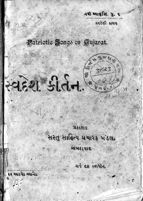 Another interesting fact should also be noted. Gandhi influenced Gujarati language and literature to such an extent that the period between 1920 and 1950 is usually referred to as the Gandhian Period of Gujarati literature. So, one would expect Gujarati books and periodicals to lead the tally of banned books in India. But the number of forfeited Gujarati books is considerably less compared to some other languages. As per figures provided by the National Archives of India, largest number of such items (402) belongs to Hindi. Urdu comes second with 126 items, and Punjabi third with 114 items. These are followed by English (89 items), Marathi (88 items), Gujarati (61 items), and Bengali (48 items).
Another interesting fact should also be noted. Gandhi influenced Gujarati language and literature to such an extent that the period between 1920 and 1950 is usually referred to as the Gandhian Period of Gujarati literature. So, one would expect Gujarati books and periodicals to lead the tally of banned books in India. But the number of forfeited Gujarati books is considerably less compared to some other languages. As per figures provided by the National Archives of India, largest number of such items (402) belongs to Hindi. Urdu comes second with 126 items, and Punjabi third with 114 items. These are followed by English (89 items), Marathi (88 items), Gujarati (61 items), and Bengali (48 items).
The earliest a Gujarati book was proscribed was in 1907. This was a book entitled Swadesh Kirtan Part 1. This 32 page booklet was published by Swadesh Mitra Mandal, Ahmedabad, and was printed by Chandra Prakash Press. The last one to be proscribed was a 94 page biography of Pandit Jawaharlal Nehru, written by Labhuben Mehta and published in 1941 by Bharati Sahitya Sangh, Ahmedabad. Labhuben is the only woman to appear in the list of authors of books proscribed by the British Government.
Swadesh kirtan, an anthology of patriotic songs, was first published in 1906, but somehow it seems to have escaped being noticed by the British Government. This was preceded by another anthology named Deshbhakti. That too was not proscribed. But second edition of Swadesh kirtan, published in 1907 was proscribed. The title page of this book does not mention any one as its editor. But the preface mentions the name of Ramanbhai Neelkanth (1868-1928), a leading Gujarati litterateur, as its editor. A possible reason for this is that the second edition had many more songs compared to the first edition. Second edition contains 83 songs. Some of the additions may have been found to be objectionable.
 Narayan Vasanji Thakkur (1884-1938) was a prolific writer. He published more than 100 books. One of his social novels Aajkaalno Sudharo ke Ramaneey Bhayankarta published in 1911 was also proscribed. Even with a close reading, one cannot find anything against the Government in this 352 page novel. Then why would the Government ban it? This was perhaps because the book is out and out against social reforms. And in the process of denigrating the movement for social reforms, it also criticizes, even ridicules, everything British – their social, educational, and legal systems, their penchant for alcohol and non-vegetarian food, etc. Ever since the social reform movement began in Gujarat in the second quarter of the 19th century, a small but vociferous group opposed everything modern, everything western. Thakkur belonged to this group.
Narayan Vasanji Thakkur (1884-1938) was a prolific writer. He published more than 100 books. One of his social novels Aajkaalno Sudharo ke Ramaneey Bhayankarta published in 1911 was also proscribed. Even with a close reading, one cannot find anything against the Government in this 352 page novel. Then why would the Government ban it? This was perhaps because the book is out and out against social reforms. And in the process of denigrating the movement for social reforms, it also criticizes, even ridicules, everything British – their social, educational, and legal systems, their penchant for alcohol and non-vegetarian food, etc. Ever since the social reform movement began in Gujarat in the second quarter of the 19th century, a small but vociferous group opposed everything modern, everything western. Thakkur belonged to this group.
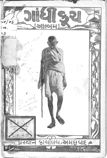 It was intriguing for me to find an album of Gandhiji’s photographs in the list of proscribed books. But when I saw the book, the reason for doing so was apparent. All photographs in the book relate to the 1930 Dandi March and the accompanying text, written by Rasiklal Parikh (1897-1982) is highly critical of the Government’s handling of the March. He has also quoted extensively from Gandhiji’s articles and speeches.
It was intriguing for me to find an album of Gandhiji’s photographs in the list of proscribed books. But when I saw the book, the reason for doing so was apparent. All photographs in the book relate to the 1930 Dandi March and the accompanying text, written by Rasiklal Parikh (1897-1982) is highly critical of the Government’s handling of the March. He has also quoted extensively from Gandhiji’s articles and speeches.
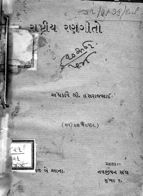 Even after considerable efforts, I have not been able to find any biographical details for ‘Blind Poet Hansrajbhai.’ But he was one of the most popular songsters during the period of our freedom movement. Rashtreey Rangeeto is an 18 page booklet, but almost every page has dynamite laid on it for the British Government. One of the songs opens thus:
Even after considerable efforts, I have not been able to find any biographical details for ‘Blind Poet Hansrajbhai.’ But he was one of the most popular songsters during the period of our freedom movement. Rashtreey Rangeeto is an 18 page booklet, but almost every page has dynamite laid on it for the British Government. One of the songs opens thus:
ક્યાં સુધી સામ્રાજ્ય સત્તા, ચંદરોજ
ક્યાં સુધી એની મહત્તા, ચંદરોજ.
It can be loosely translated as:
How long would the Empire last? Few days, indeed.
How long would its glory last? Few days, indeed.
Another song describes British Courts as temples of injustice. But perhaps the most popular song was
પરદેશી ભૂખ્યાં ટોપીવાળાનાં ટોળાં ઉતર્યાં.
How the hoards of hungry vultures that have descended on our Motherland from abroad have ruined and ransacked our rich treasures – that is the theme of this longish song. During my childhood I heard this song being sung by my elder brother who was a staunch Gandhian and who participated in the freedom movement.
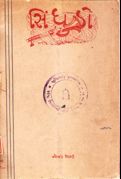 Traditionally, we refer to Gujarati literature produced between 1920 and 1950 as literature of the Gandhian Period (Gandhi Yug). But surprisingly, not many books written by leading lights of this period appear in the list of banned books. Two exceptions are Zaverchand Meghani and Manubhai Pancholi, alias ‘Darshak.’ Zaverchand Meghani earned the title of ‘the National Poet’ from a person no less than Gandhiji. Most of the poets and poems related to our freedom movement are almost forgotten today, but Meghani and his poems are an exception. His Sindhoodo, a 30 page booklet containing only 16 songs, is perhaps the most celebrated of books proscribed by the British Government. It was first published on April 6, 1930, the first day of the Civil Disobedience Movement. By the time the British Government proscribed it, most of its ten thousand copies were already sold. Unnerved by its popularity, the British Government charged Meghani with making a seditious speech and the Court at Dhandhuka (a town in Saurashtra region of Gujarat) sentenced him to imprisonment for two years. After the magistrate delivered his judgment, with his permission, Meghani recited one of the poems contained in Sindhoodo.
Traditionally, we refer to Gujarati literature produced between 1920 and 1950 as literature of the Gandhian Period (Gandhi Yug). But surprisingly, not many books written by leading lights of this period appear in the list of banned books. Two exceptions are Zaverchand Meghani and Manubhai Pancholi, alias ‘Darshak.’ Zaverchand Meghani earned the title of ‘the National Poet’ from a person no less than Gandhiji. Most of the poets and poems related to our freedom movement are almost forgotten today, but Meghani and his poems are an exception. His Sindhoodo, a 30 page booklet containing only 16 songs, is perhaps the most celebrated of books proscribed by the British Government. It was first published on April 6, 1930, the first day of the Civil Disobedience Movement. By the time the British Government proscribed it, most of its ten thousand copies were already sold. Unnerved by its popularity, the British Government charged Meghani with making a seditious speech and the Court at Dhandhuka (a town in Saurashtra region of Gujarat) sentenced him to imprisonment for two years. After the magistrate delivered his judgment, with his permission, Meghani recited one of the poems contained in Sindhoodo.
હજારો વર્ષની જૂની અમારી વેદનાઓ,
કલેજાં ચીરતી કંપાવતી અમ ભયકથાઓ
A report published in the weekly ‘Saurashtra’ of May 3, 1930 says that when Meghani recited this poem, everyone in the jam packed court room was in tears, including Judge Isani. The book was issued in hand written and mimeographed edition exactly after two years of its first publication, that is on April 6, 1932, and five thousand copies were sold out in no time. Subsequently, the book has been reprinted several times, the last enlarged edition being in 2011.
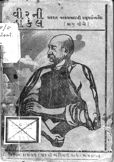 Sardar Vallabhbhai Patel’s speeches made during the 1930 movement were collected in two volumes under the title Veerni Hakal. The first edition of ten thousand copies of the first volume was sold out within no time. Second volume was published within a few months. However, the British Government proscribed both volumes. Preface to the first volume was written by Mahadev Desai, personal secretary to Gandhi, while awaiting arrest in a police station.
Sardar Vallabhbhai Patel’s speeches made during the 1930 movement were collected in two volumes under the title Veerni Hakal. The first edition of ten thousand copies of the first volume was sold out within no time. Second volume was published within a few months. However, the British Government proscribed both volumes. Preface to the first volume was written by Mahadev Desai, personal secretary to Gandhi, while awaiting arrest in a police station.
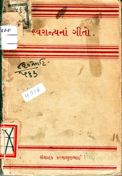 Kalyanji Mehta, a veteran freedom fighter from Surat collected some songs popular during the freedom struggle under the title Swarajyana Geeto. The first volume containing some 155 songs by various poets was published in 1931 to mark Gandhiji’s birth day, and was soon proscribed. The second edition, containing 157 songs, was published in 1938 to mark the 51st Session of the Congress held at Haripura. By this time, the then Bombay State had a Congress Government, and its Home Minister Dr. Kanaiyalal Munshi had revoked the ban imposed earlier.
Kalyanji Mehta, a veteran freedom fighter from Surat collected some songs popular during the freedom struggle under the title Swarajyana Geeto. The first volume containing some 155 songs by various poets was published in 1931 to mark Gandhiji’s birth day, and was soon proscribed. The second edition, containing 157 songs, was published in 1938 to mark the 51st Session of the Congress held at Haripura. By this time, the then Bombay State had a Congress Government, and its Home Minister Dr. Kanaiyalal Munshi had revoked the ban imposed earlier.
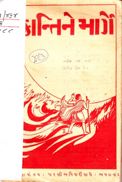 Krantine Marge, (On the Road to Revolution) was written in 1930 but was published in 1932. Author Prabhakar Biharilal wanted Kaka Kalelkar to write its preface and so gave him the manuscript. Kalelkar put it in his travel bag so that he can read it while traveling. But the bag was stolen during one of his train journeys. Kalelkar issued press advertisements requesting the thief to return at least the manuscript. But he did not. Luckily, the author had another copy of the book and Kalelkar ultimately wrote preface to the book, hence the delay in its publication. But the book was proscribed soon after its publication.
Krantine Marge, (On the Road to Revolution) was written in 1930 but was published in 1932. Author Prabhakar Biharilal wanted Kaka Kalelkar to write its preface and so gave him the manuscript. Kalelkar put it in his travel bag so that he can read it while traveling. But the bag was stolen during one of his train journeys. Kalelkar issued press advertisements requesting the thief to return at least the manuscript. But he did not. Luckily, the author had another copy of the book and Kalelkar ultimately wrote preface to the book, hence the delay in its publication. But the book was proscribed soon after its publication.
Manubhai Pancholi, ‘Darshak,’ a leading Gandhian freedom fighter and Gujarati litterateur, published two plays in quick succession. Jaliyavaalaa was published in 1934 and 1857 in 1935. Both were proscribed by the Government. The reason is obvious. Both works, as plays, are poorly written. Raghuveer Chaudhari, a leading critic has described them as rough drafts of plays that Darshak wished to write. Later on Darshak wrote a novel, Bandhan ane Mukti, dealing with the 1857 events. The novel is much more satisfactory than the play. What is more remarkable is the preface to ‘1857,’ written by Amritlal Sheth, a leading journalist and freedom fighter. In his preface he obviously disagrees with British historians who dubbed what happened in 1857 as ‘Sepoy Mutiny.’ But he also disagrees with Sawarkar and his followers who described the events of 1857 as ‘War of Independence.’ Sheth argues that the rulers were interested in getting back their lost power from the British Government. None of them was fighting for the power to the people. Sheth also believes that as a result of the 1857, the princely states became stronger, because they were spared the hanging sword of the ‘Doctrine of Lapse’ followed by Lord Dalhousie. Sheth argues that had 1857 not happened, most of the territories would have come under the British Rule, and this would have united the country. One may or may not agree with Sheth, but one must appreciate his frankness and boldness. 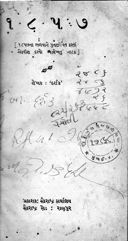
Prasthan Karyalaya, founded by Ramnarayan V. Pathak (1887-1955) has the distinction of having largest number of its publications getting proscribed. Pathak initially started Prasthan, a monthly. Later on he entered into book publishing and got seven of his books proscribed. Pathak, a staunch Gandhian, had joined Gujarat Vidyapeeth, founded by Mahatma Gandhi. While serving as a teacher of Gujarati language and literature, he started his monthly, off course with the knowledge and permission of the Vidyapeeth. However, when Kaka Kalelkar took over as its Chancellor (Kulapati) he insisted that Pathak should not publish anything against Gandhian ideals and ideas in his monthly. Pathak disagreed saying this would amount to curtailing freedom of thought and speech. All he can do is publish a rejoinder, if and when sent by Vidyapeeth. But Kalelkar stood firm, and so Pathak resigned his job and devoted all his time and energy to his monthly. Thus, he suffered at the hands of both, Gandhian Gujarat Vidyapeeth as well as the British Government.
To sum up, most of the books that were highly popular during our freedom movement, and were proscribed by the British Government, are almost forgotten today. They were topical, and catered to the immediate need of instilling ‘deshbhakti.’ However, they form an important part of our literature, culture, and history. Hence they should be made easily available to those who wish to read them. For doing so, we need not reprint all these books. But National Archives or some other agency can easily scan them and load them on a website. This would save these books not only from physical disintegration, but also from getting dumped in the back yard of our collective memory. *
_____________________________________________________________
*Paper presented at a State-level Seminar on ‘Proscribed Literature in India, 1757-1947’ hosted by the Department of History, S.N.D.T. Women’s University at Mumbai, on March 21 and 22, 2013
e.mail : deepakbmehta@gmail.com
![]()

